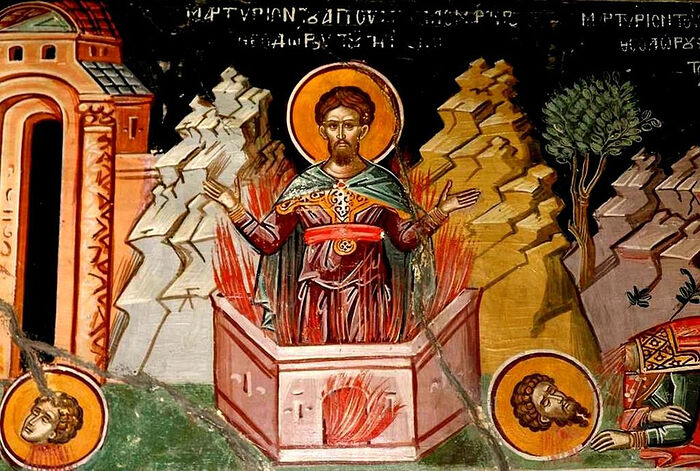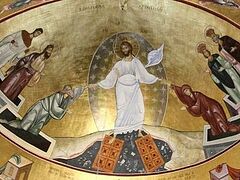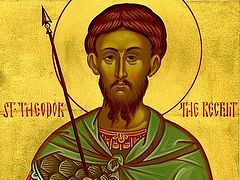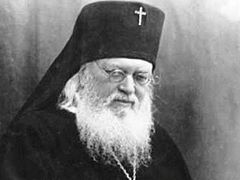The Lord tells us to seek first the Kingdom of Heaven, and everything else will be added unto us. We are called not to pursue worldly goals or goods, but to seek the things of God. And the things of God, the things that God will ask of us when we all stand before Him at the Dread Judgment, are often radically at odds with the things of the world.
Today’s commemoration of St. Theodore the Tyro, or Recruit, gives us another opportunity to contemplate this truth of our Orthodox faith.
In the troparion of St. Theodore we sing: “Great are the accomplishments of faith!”
But what are these accomplishments? His troparion continues: “The holy martyr Theodore rejoiced in the fountain of the flames as though in the still waters of rest; consumed in the fire, he was offered as a sweet bread unto the Trinity. At his intercessions, Christ our God, do Thou save our souls.”
The great accomplishment of St. Theodore, extolled by the Church on this day, was to be burned alive! To the world, this is pure madness. “Fool! Why dost thou vainly set thy trust in a man that was put to death?” the impious governor mocked the martyr.[1] But the holy Apostle Paul already told us 2,000 years ago that the Cross is foolishness to the world.
Rebuking the blindness of the governor, St. Theodore was consumed by the flames, and so became a sacrifice—a “sweet bread”—to God.
About 200 years before St. Theodore suffered for Christ, St. Ignatius of Antioch also laid down his life for the Lord. In his Epistle to the Romans, composed on the road to his martyrdom in Rome, he wrote in terms similar to what we read in the troparion of St. Theodore:
Allow me to become food for the wild beasts, through whose instrumentality it will be granted me to attain to God. I am the wheat of God, and let me be ground by the teeth of the wild beasts, that I may be found the pure bread of Christ. Rather entice the wild beasts, that they may become my tomb, and may leave nothing of my body (Chap. 4)
St. Ignatius implored the Christians in Rome not to hinder his martyrdom: “I beseech of you not to show an unseasonable good-will towards me.” In being consumed by the lions, St. Ignatius showed himself the “pure bread of Christ.”
The Lord Jesus Christ feeds us with His Most-Pure Body and Blood under the form of bread and wine, and the martyrs and saints likewise become a sweet offering not only to God, but also to the faithful, feeding us by their fearless example and their prayers before the throne of God.
Though devoured by lions, it is St. Ignatius who roars like a lion through history, having given himself up as an offering in imitation of the Lion of Judah.
And further, he speaks of his coming death as his birth, his transition from the state of death to that of life. This is a profound truth of the holy Orthodox faith, but folly to those who do not believe. “Lord willing, we shall celebrate the birthday of his martyrdom each year with joy and rejoicing,” reads the Martyrdom of St. Polycarp of Smyrna.
As St. Ignatius found his repose in the belly of the wild beasts, so St. Theodore found his in the flames—the “still waters of rest,”[2] where the Lord nourishes us and restores the souls of those who seek after Him. (cf. Ps. 22:2)
“Because they served the passions, they thought that God Himself is subject to passion” (and thus in need of sacrifices offered to idols), the Church sings of those who persecuted the Martyr Theodore.[3] But he served not the passions, but rather the Passion. He fashioned not a god after his own fallen image, but rather a life according to the image of the Father—the Lord Jesus Christ.
And marveling at St. Theodore’s feat, let us consume the “sweet bread” of his offering to the Lord and His faithful, strengthening our own faith after his courageous example, that our lives might also become a sacrifice to the Lord.
Let us lay aside all earthly cares, striving rather after the things of God, that we might be able to sing together with the Church in sincerity of heart: “I know the desire for God which filled thy heart, O Theodore.”[4]
Great are the accomplishments of faith!




